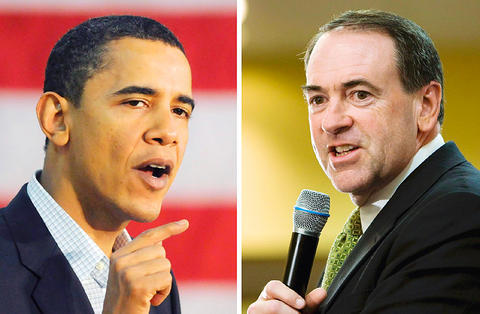Democrat Barack Obama and Republican Mike Huckabee won the Iowa caucuses, the crucial opening test of the US presidential race. But there was little time for celebration yesterday, as the candidates rushed off to New Hampshire, where the first primary election is just five days away.
With his victory on Thursday night, Obama, a US senator who is bidding to become the first black president of the US, pushed expected front runner Hillary Rodham Clinton to third place. John Edwards came in second among Democrats.
In the Republican field, Huckabee, a Baptist preacher-turned-politician, rode a wave of support from evangelical Christians to victory. Huckabee handily defeated Mitt Romney despite being outspent by tens of millions of dollars. Just months ago, Huckabee was virtually unknown outside Arkansas, where he served as governor.

PHOTO: EPA
Iowa's results tightened the Democratic field; senators Joe Biden and Christopher Dodd dropped out shortly after the outcome was clear on Thursday night.
Obama, 46 and a first-term senator from Illinois, tapped into Democrats' yearning for change after Republican President George W. Bush's two terms in office. Final Democratic returns showed Obama gaining 38 percent support. Edwards, a former senator who was the Democrats' 2004 vice presidential candidate, finished second, edging out Clinton, wife of former president Bill Clinton.
"We are choosing hope over fear," Obama told a raucous victory rally. "We're choosing unity over division and sending a powerful message that change is coming to America."
"A new day is needed in American politics, just like a new day is needed in American government," Huckabee told cheering supporters. "It starts here, but it doesn't end here."
The defeats in Iowa are major setbacks for Clinton and Romney, both of whom had long been front runners in the Midwestern state.
Obama now has fresh momentum going into Tuesday's primary elections in New Hampshire, where he and Clinton have been locked in a tight race. A weakened Romney could boost McCain's hopes of winning New Hampshire, where the two Republicans have been tied in the polls. Huckabee has had little support in that northeastern US state.
The Iowa and New Hampshire contests launch an intense, five-week period that will culminate in more than two dozen contests on Feb. 5.
With Bush constitutionally blocked from seeking re-election, both parties had wide-open, costly campaigns. Clinton has led the Democratic race in national polls, while McCain, Huckabee and former New York Mayor Rudy Giuliani have led the Republicans nationally.
Clinton and Edwards vowed to fight on in the New Hampshire primary.
"We have always planned to run a national campaign," Clinton told supporters at a noisy rally.
"I am so ready for the rest of this campaign, and I am so ready to lead," Clinton said.

MORE VISITORS: The Tourism Administration said that it is seeing positive prospects in its efforts to expand the tourism market in North America and Europe Taiwan has been ranked as the cheapest place in the world to travel to this year, based on a list recommended by NerdWallet. The San Francisco-based personal finance company said that Taiwan topped the list of 16 nations it chose for budget travelers because US tourists do not need visas and travelers can easily have a good meal for less than US$10. A bus ride in Taipei costs just under US$0.50, while subway rides start at US$0.60, the firm said, adding that public transportation in Taiwan is easy to navigate. The firm also called Taiwan a “food lover’s paradise,” citing inexpensive breakfast stalls

TRADE: A mandatory declaration of origin for manufactured goods bound for the US is to take effect on May 7 to block China from exploiting Taiwan’s trade channels All products manufactured in Taiwan and exported to the US must include a signed declaration of origin starting on May 7, the Bureau of Foreign Trade announced yesterday. US President Donald Trump on April 2 imposed a 32 percent tariff on imports from Taiwan, but one week later announced a 90-day pause on its implementation. However, a universal 10 percent tariff was immediately applied to most imports from around the world. On April 12, the Trump administration further exempted computers, smartphones and semiconductors from the new tariffs. In response, President William Lai’s (賴清德) administration has introduced a series of countermeasures to support affected

CROSS-STRAIT: The vast majority of Taiwanese support maintaining the ‘status quo,’ while concern is rising about Beijing’s influence operations More than eight out of 10 Taiwanese reject Beijing’s “one country, two systems” framework for cross-strait relations, according to a survey released by the Mainland Affairs Council (MAC) on Thursday. The MAC’s latest quarterly survey found that 84.4 percent of respondents opposed Beijing’s “one country, two systems” formula for handling cross-strait relations — a figure consistent with past polling. Over the past three years, opposition to the framework has remained high, ranging from a low of 83.6 percent in April 2023 to a peak of 89.6 percent in April last year. In the most recent poll, 82.5 percent also rejected China’s

PLUGGING HOLES: The amendments would bring the legislation in line with systems found in other countries such as Japan and the US, Legislator Chen Kuan-ting said Democratic Progressive Party (DPP) Legislator Chen Kuan-ting (陳冠廷) has proposed amending national security legislation amid a spate of espionage cases. Potential gaps in security vetting procedures for personnel with access to sensitive information prompted him to propose the amendments, which would introduce changes to Article 14 of the Classified National Security Information Protection Act (國家機密保護法), Chen said yesterday. The proposal, which aims to enhance interagency vetting procedures and reduce the risk of classified information leaks, would establish a comprehensive security clearance system in Taiwan, he said. The amendment would require character and loyalty checks for civil servants and intelligence personnel prior to